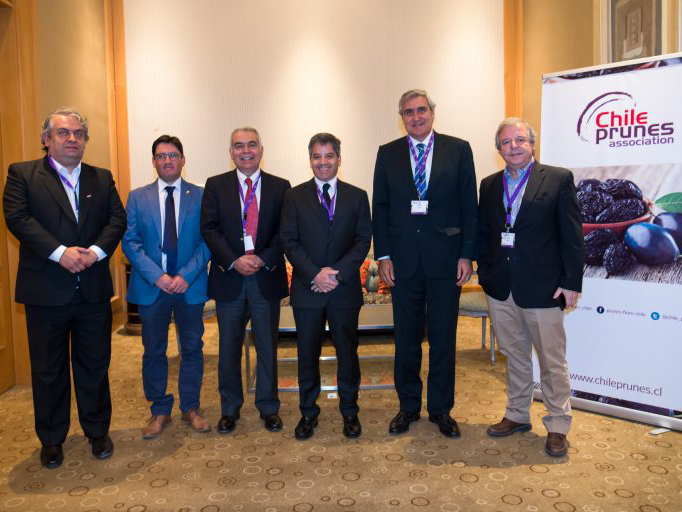With a presence of close to 300 people, mainly producers, but also exporters and authorities, the 7th EXPO Ciruelas Secas held at the Monticello Convention Center became the perfect instance to bring back a sector that bases much of its success on the associativity with which all its members work, also giving a sign of unity in difficult times for the country.
“We had doubts about the call for what has been going on in Chile for the last 30 days, but the massive response we have had realizes that, despite the problems, this is an industry that is standing, that in the agro, and specifically in the prunes business, is operating normally, with our packing running and our fruit being exported without major inconveniences” Pedro Pablo Díaz, president of Chile Prunes, the organising body of the event, said Pedro Pablo Díaz.
In this version, the formation of a panel composed of experts that addressed all contingencies, both political-economic and climatic. In this sense, the Undersecretary of Agriculture, Alfonso Vargas, emphasized that one way to deal with adverse scenarios is to work together to stimulate advances that allow lower costs, increase synergies, increase productivity and increase profitability. “That’s why President Sebastián Piñera’s government program stimulates cooperativeism, especially between small and medium-sized producers,” the authority said.
In turn, ProChile’s CEO Jorge O’Ryan acknowledged that Chile is in a process of inevitable changes that will be positive in the long run. But, to address the harsh conditions faced today by small and medium-sized exporters, the agency is adopting supportive measures such as simplification of formalities, adoption of logistics agreements, discounts on promotional activities, efforts to better connect supply with demand, and business intelligence initiatives (e.g. virtual business wheels). “This industry should not be left behind in terms of innovation, so I call on them to use all the technological tools available, including ‘Chile B2B’de ProChile’, he emphasized.
Complementing the previous exhibitions, the metropolitan director of Corfo, Alvaro Undurraga, pointed out that the corporation will work “on what is its core bussines: the reconstruction and productive promotion after a serious country-problem, as in its origins, because Corfo was born to overcome the state of prostration in which the country had remained after the Chillán earthquake of 1939”.
In another field, the publicist and international speaker expert in the digital area, Roberto Arancibia, emphasizes that the innovations present in the agricultural area are something present in the Chilean market, not the future, and that we should be encouraged to incorporate them. “Companies large, medium and small must get used to the new format, they must live the digital transformation that will allow them to digitize, automation and that are not expensive, they are at hand, but they must understand that they need to be transformed, and that is also possible in an orchard, with automation, irrigation, pruning, etc.,” he says.
Climate emergency
Given the severe drought affecting the country’s Central Zone and its impact on agricultural production, attendees also had the opportunity to hear exhibitions on the climatic aspects of the season, the challenges of watering in periods of water scarcity and methods to improve the efficiencies of irrigation systems, among other topics, which were in charge of which were in charge of , respectively, of the founder of the UC Global Change Center, Francisco Meza; the executive director of the Corporación Reguemos Chile, Maximiliano Letelier, and Allan Fulton, agricultural advisor to the Cooperative Extension at the University of California.
“One of the most important contingencies we are experiencing now is climate and lack of water, and it was important to offer a panel explaining where this threat is going that year after year shows a fall in rainfall, rising temperatures and lower river flow, all of which force changes in agricultural management and management , to better manage the water shortage that we are sure to suffer this year and the next year,” Chile’s Vice President Prunes, Javier Plaza, said on this issue. Despite the complex scenario, Pedro Pablo Díaz said that optimism is an essential part of the prunes industry, and that the sector is setting an example by having all its actors, “those who produce and who process, and especially the collaborators, working normally in their work even in the most difficult times”.




